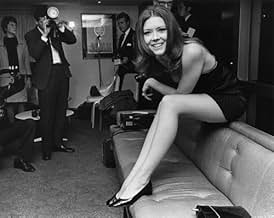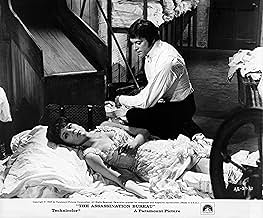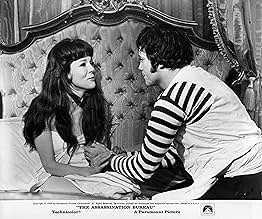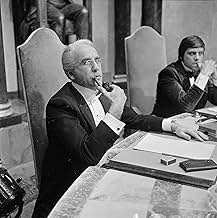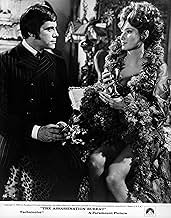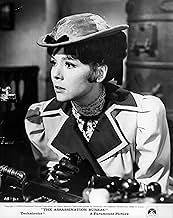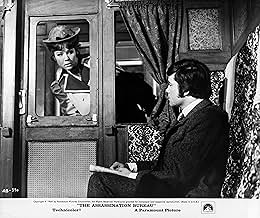IMDb RATING
6.4/10
3.9K
YOUR RATING
A woman causes a group of assassins to face their greatest challenge.A woman causes a group of assassins to face their greatest challenge.A woman causes a group of assassins to face their greatest challenge.
- Awards
- 2 nominations total
Curd Jürgens
- Gen. von Pinck
- (as Curt Jurgens)
John Abineri
- Police Inspector
- (uncredited)
John Adams
- French President
- (uncredited)
Jonathan Adams
- French President
- (uncredited)
Featured reviews
In turn of the century London, a female journalist (Diana Rigg) pays for an assasination organisation to assassinate their own leader (Oliver Reed) whom she eventually falls in love with. He in turn bumps off any of his assailants.
Produced and co-written by Michael Relph, this zany big budget comedy is very much of its time with a dark himour that doesn't quite pay off; the comedy is not sharp enough to have a broad appeal or even provide many laughs, but is a fast moving, colourful film (shot by Geoffrey Unsworth) that has plenty to look at.
Produced and co-written by Michael Relph, this zany big budget comedy is very much of its time with a dark himour that doesn't quite pay off; the comedy is not sharp enough to have a broad appeal or even provide many laughs, but is a fast moving, colourful film (shot by Geoffrey Unsworth) that has plenty to look at.
This charming film, made when Oliver Reed and Diana Rigg were at the height of their appeal, is what they used to call a "romp", when it wasn't considered to be a putdown. Reed, as Ivan, born and bred to lead an international group of highly-placed assassins, is hired by would-be reporter Sonia (Rigg) to have his group kill him, and realizing that his house badly needs some cleaning out, Ivan accepts the commission. The rest is a whirlwind tour of Europe, taking out substantial portions of the terrain as they go, avoiding bungled attempts on his life as he tries to track down the traitors who would turn the Bureau into a political machine. The dialogue is refreshingly devoid of political correctness, but maintains a firm respect between the unlikely couple as they go from bickering rivalry to bickering fondness. Guest villains include Clive Revill as a gluttonous Italian, and sad stories include the accidental demise of Roger Delgado (Dr. Who, the first Master) while on location. Much worth the time and effort, although sadly almost never seen on TV, and abysmally represented in video release.
Back in the mid-'60s, Diana Rigg was probably responsible for jump-starting the puberties of millions of baby boomer boys, thanks to her portrayal of Emma Peel in the hit BBC program "The Avengers." At any rate, along with Anne Francis' turn on "Honey West" and just about every woman in the first five Bond movies, she was certainly responsible for jump-starting mine, and I love watching her in anything she does even today, almost 40 years later. (Seeing her "Medea" on Broadway in 1994 was especially satisfying.) In "The Assassination Bureau" (1969), Diana plays a British (natch) freelance reporter in turn-of-the-century London who infiltrates Oliver Reed's titular organization (a sort of political Murder Inc.) and hires him to put a hit on...himself! Thus starts a series of wild and woolly escapades, as Reed races all over Europe trying to kill his organization's principals, before they can do away with him. We get tongue-in-cheek episodes (filmed all over Europe, and with lavish production values) involving a Parisian brothel, a Swiss bank, the beer halls of Vienna and the canals of Venice, all culminating in a fierce, exciting battle on an airborne, primitive zeppelin, with the fate of the Continent hanging in the balance. The film moves along very briskly and is quite entertaining, and Curt Jergens and Telly Savalas (who starred with Rigg that same year in "On Her Majesty's Secret Service") add delicious supporting performances. Diana, need I say, looks absolutely gorgeous, especially when shown in those frilly undergarment and bathtub scenes. Featuring a literate, witty script and consistently amusing and inventive situations, "The Assassination Bureau" is a real treat indeed. And Diana Rigg's exquisite presence is the yummy icing on an already tasty cake.
This is the kind of movie made with care and respect for the audience:lavish sets,dazzling costumes,and a very attractive cast including Diana Rigg,Telly Savalas -both teamed for "on her majesty's secret service" the same year-,Philippe Noiret,Curd Jurgens and the sadly missed Oliver Reed.
The screenplay is often full of wit and humor,with such lines as "if there's a war,people will kill each others for a penny,and we will have to shut up shop (our "assassination bureau").Actually the whole movie is a long chase through a chocolate-box Europa with a lot of traps,bombs and disguises.Diana Rigg's appearances run the whole gamut from a Victorian prude resembling Mary Poppins to a femme fatale,from a widow in deep mourning to a nun,she's astonishing.So does (and is )Oliver Reed,who plays some British Arsène Lupin.History is given a rough ride when Francis-Ferdinand is murdered in Vienna (instead of Sarajevo) but who cares?
Best scene:Diana Rigg is alone in her hotel bedroom in Venice,Italy:she can hear a ticking.No,it's not the clock.So she rushes into her bathroom where a tap(faucet) is dripping.But when it's closed,the noise still remains.Is-it a bomb? .The brothel scene where Rigg is mistaken for a hooker is also great fun!
Two movies made in the seventies might have been influenced by Basil Dearden's amusing comedy:Douglas's Hickox's "theater of blood" (1973) also starring Rigg- a treat that should not be missed-and Ted Kotcheff's "who's killing the great chefs of Europe?" (1978)-Jacqueline Bisset cooks a bombe glacée here-.The people who liked this movie could do worse than picking those delightful black comedies.
The screenplay is often full of wit and humor,with such lines as "if there's a war,people will kill each others for a penny,and we will have to shut up shop (our "assassination bureau").Actually the whole movie is a long chase through a chocolate-box Europa with a lot of traps,bombs and disguises.Diana Rigg's appearances run the whole gamut from a Victorian prude resembling Mary Poppins to a femme fatale,from a widow in deep mourning to a nun,she's astonishing.So does (and is )Oliver Reed,who plays some British Arsène Lupin.History is given a rough ride when Francis-Ferdinand is murdered in Vienna (instead of Sarajevo) but who cares?
Best scene:Diana Rigg is alone in her hotel bedroom in Venice,Italy:she can hear a ticking.No,it's not the clock.So she rushes into her bathroom where a tap(faucet) is dripping.But when it's closed,the noise still remains.Is-it a bomb? .The brothel scene where Rigg is mistaken for a hooker is also great fun!
Two movies made in the seventies might have been influenced by Basil Dearden's amusing comedy:Douglas's Hickox's "theater of blood" (1973) also starring Rigg- a treat that should not be missed-and Ted Kotcheff's "who's killing the great chefs of Europe?" (1978)-Jacqueline Bisset cooks a bombe glacée here-.The people who liked this movie could do worse than picking those delightful black comedies.
After reading the other comments here, I wonder if these folks saw the same movie. This film is a lot of fun, a touch on the slap-stick side and it isn't supposed to be Bond OR the Pink Panther. Maybe the problem is generational??? Those of us who grew up in the far away and ancient times learned that there didn't have to be an action sequence every thirty seconds, lots of overt sex and toilet humor. These things are what seem to "make" a movie today and it's why a lot of people of my generation a) don't go to a lot of films today and b) really worry about the ones who think the named qualities are what make a movie "good". Oh, well. Every generation has to grow up. When they do, maybe they will find that The Assassination Bureau really is the laugh riot while The American Pies and What About Marys are noted to be rather--well--gross.
Did you know
- TriviaJack London's original novel was left markedly incomplete at the time of his death, and it was not until many decades later that the thriller-writer Robert L. Fish (also known as Robert L. Pike) finished it for publication, amidst much publicity. The novel is noticeably more serious in tone than this movie, although a New York Times review at the time called it "delightfully ridiculous."
- GoofsIn the scene about 40-45 minutes in where Lord Bostwick visits General Van Pinck whilst the latter is at fencing practice, there's a map of Europe on the wall. Although this film ostensibly takes place before World War I, the map is of post-Versailles Europe, c.1925-1939.
- Quotes
Miss Winter: With your ideas, I'm surprised you're shocked at the thought of war.
Ivan Dragomiloff: Not at all. It's purely a matter of business. How can we charge our sort of prices with everybody happily killing each other for a shilling a day?
- How long is The Assassination Bureau?Powered by Alexa
Details
- Release date
- Country of origin
- Languages
- Also known as
- El sindicato del crimen
- Filming locations
- Cliveden House, Taplow, Buckinghamshire, England, UK(Lord Bostwick riding in the woods towards Ruthenia)
- Production company
- See more company credits at IMDbPro
- Runtime
- 1h 50m(110 min)
- Sound mix
- Aspect ratio
- 1.85 : 1
Contribute to this page
Suggest an edit or add missing content

